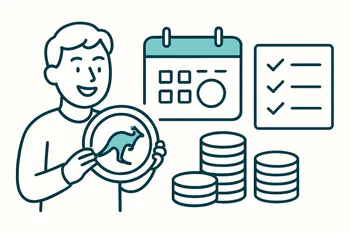Navigating Business Loans with Bad Credit
- Personal Finance
- 04 Mins read

Understanding Bad Credit and Its Impact on Business Loans
Bad credit can feel like a heavy anchor, dragging down even the most promising business ideas. When your credit score is low, obtaining a loan can seem daunting. But why does bad credit matter in the first place? Simply put, lenders use your credit score to assess the risk of lending you money. A lower score can signal potential issues with repayment, making lenders hesitant to approve your loan application.
What Constitutes Bad Credit?
Credit scores typically range from 300 to 850. In Australia, a score below 550 is often considered "bad." Factors that influence your credit score include:
- Payment History: Missing payments can significantly impact your score.
- Credit Utilisation: Using a large portion of your available credit can indicate financial stress.
- Length of Credit History: A shorter history can be a red flag for lenders.
- Types of Credit Used: A mix of credit types (like credit cards and loans) can benefit your score.
Understanding these elements can help you take control of your financial situation.
Exploring Your Options
Even with bad credit, there are still avenues for securing a business loan. Here are some options to consider:
Alternative Lenders: Non-traditional lenders often have more flexible criteria. They may look at factors beyond just your credit score, such as your business plan and cash flow.
Secured Loans: If you can offer collateral (like property or equipment), lenders may be more willing to approve your loan. This reduces their risk.
Peer-to-Peer Lending: Platforms that connect borrowers with investors can be a viable option. They often have less stringent requirements than banks.
Angel Investors or Venture Capital: If your business idea has high growth potential, you might attract investment from individuals or firms that provide capital in exchange for equity.
Microfinance Institutions: These organizations specialize in providing small loans to entrepreneurs, particularly in underserved markets.
Tips for Increasing Your Chances of Approval
Improving your chances of securing a loan when you have bad credit requires strategic planning. Here are some effective strategies:
Strengthen Your Business Plan: A detailed, well-researched business plan demonstrates your knowledge and inspires confidence in lenders.
Showcase Cash Flow: Lenders want to see that you have enough revenue to repay the loan. Maintain clear records of your income and expenses.
Consider a Co-Signer: A co-signer with better credit can help secure your loan. This person agrees to take on the repayment responsibility should you default.
Build Relationships with Lenders: Being on good terms with your bank or local credit union can make a difference. Regularly communicate about your business and financial goals.
Real-life Example: A Case Study
Consider Sarah, who started a catering business. After facing some tough financial times, her credit score fell to 520. Despite this setback, Sarah was determined to grow her business.
Instead of getting discouraged, she took a proactive approach. She meticulously prepared a business plan that outlined her target market, marketing strategies, and financial projections. After researching various lending options, she decided to approach a peer-to-peer lending platform.
Sarah was transparent about her credit history but focused on showing her cash flow and detailed plans for the future. Her efforts paid off. Not only did she secure the funds she needed, but she also gained valuable insights from the investors she spoke with during the process.
Key Takeaways
- Bad credit is not the end: There are still options available.
- Alternative lenders and microfinance: Often have more flexible requirements.
- Preparing a strong business plan and showcasing cash flow: Can significantly improve your chances of approval.
Strategies for Repairing Your Credit
While seeking immediate financing, it's essential to start improving your credit score for future opportunities. Here are some actionable steps:
Pay on Time: Start paying all your bills promptly. This includes utilities, credit cards, and loans.
Reduce Credit Card Balances: Aim to keep your credit utilization below 30%. This means not using more than 30% of your available credit.
Regularly Check Your Credit Report: This way, you can identify and rectify errors or discrepancies that could be negatively impacting your score.
Consider Credit Counseling: A financial advisor can provide tailored advice on improving your credit.
Forgiveness Programs and Grants
Besides loans, explore forgiveness programs and grants that often do not require repayment. Many government and private organizations aim to support small businesses, especially those owned by underrepresented groups.
Business.gov.au: The government frequently updates information on grants and support programs available to small businesses.
Local Councils and Chambers of Commerce: These organizations often have information about community-specific funding opportunities and resources.
Final Thoughts
Navigating the business loan landscape with bad credit can seem challenging, but it is definitely possible. Perseverance is key. Equip yourself with knowledge, leverage the right resources, and never hesitate to seek help from financial advisors or mentors.
As you work towards securing your financing, remember the words of American writer Zig Ziglar: “You don’t have to be great to start, but you have to start to be great.” Embrace the journey. Each step you take is one step closer to building the business of your dreams.
In Conclusion
Your financial situation doesn't define your potential. Use the resources, strategies, and knowledge shared here to forge your path toward funding your business. With determination, creativity, and a little guidance, you can overcome your financial challenges and turn your entrepreneurial dreams into reality.



